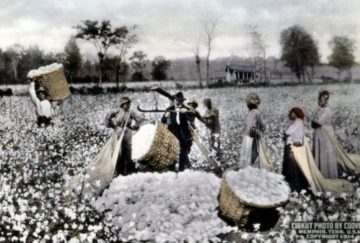Manisha Sinha in Boston Review:
 Walter Johnson is upset at the state of the historiography of slavery and rightly challenges uncritical talk of “dehumanization.” In its most extreme iteration, a few have even likened enslavement to the domestication of animals. This logic would carry us all the way back to Aristotle, who described slaves as talking tools. Pro-slavery ideologues were fond of this idea, even though southern slaveholders exploited the “human capacities” of enslaved people—to labor, reproduce, and, in Johnson’s more Genovesean formulation, “to bear witness, to provide satisfaction, to provide a living, human register of slaveholders’ power.”
Walter Johnson is upset at the state of the historiography of slavery and rightly challenges uncritical talk of “dehumanization.” In its most extreme iteration, a few have even likened enslavement to the domestication of animals. This logic would carry us all the way back to Aristotle, who described slaves as talking tools. Pro-slavery ideologues were fond of this idea, even though southern slaveholders exploited the “human capacities” of enslaved people—to labor, reproduce, and, in Johnson’s more Genovesean formulation, “to bear witness, to provide satisfaction, to provide a living, human register of slaveholders’ power.”
To advance this critique, Johnson appropriates Cedric Robinson’s thesis of racial capitalism. But he does not fully engage the antithesis of that social arrangement: what Robinson called the black radical tradition and W. E. B. Du Bois “the role black folk played” in reconstructing democracy. Radical black scholars and activists—from Robinson, Du Bois, and C. L. R. James to Claudia Jones, Ida B. Wells, Sterling Stuckey, and Vincent Harding—wrote histories not just of black oppression but also of resistance, a term that many historians of slavery and the African American experience now consider passé. Indeed, Johnson does not use the word at all. It might have an old-fashioned Marxist ring to it, but it has proven fruitful and capacious in the hands of such contemporary scholars of black politics and art as Eric Foner, Nell Painter, Steven Hahn, and Robin D. G. Kelley. These writers are heirs to a tradition that stretches back, in my reckoning, to African American abolitionists: Phillis Wheatley, Sojourner Truth, David Walker, Henry Highland Garnet, Frederick Douglass, Frances Harper, and Martin Delany. The richness of this lineage is missing from Johnson’s account even though, following Kelley, he acknowledges its contemporary activist formulation in the Movement for Black Lives’ broad-ranging manifesto, “A Vision for Black Lives.”
More here. (Note: Throughout February, at least one post will be dedicated to Black History Month. The theme for 2023 is Black Resistance. Please send us anything you think is relevant for inclusion)
